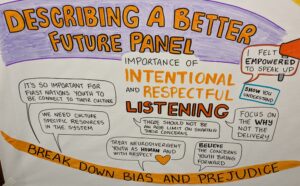Signing off in a time for change, renewal, and hope
Last Saturday I spent the day with dozens of teenagers and youth who have experienced the family justice system. I was at the Child and Youth Family Justice Conference, co-hosted by A2JBC, the Representative for Children and Youth, the Youth Voices Initiative (BC Family Justice Innovation Lab), and the Society for Children and Youth of BC.
What an inspiration to see so many young people take the time to give voice to their views and share their stories—to contribute to the future of the family justice system.

Part of the day’s graphic recording by Miranda Maslany, www.mirandamaslany.com.
I have been a judge now for 26 years and have always considered it my job to listen. On Saturday I listened to young people about what meaningful participation in the family justice system could look like, and heard how little they had been listened to when it mattered most to them. It is evident from their experiences that the justice system hasn’t done enough when it comes to putting youth at the centre.
At the conference I heard from young people in small groups and heard from two very powerful panels of diverse young people talking about how things could be different if the professionals in their lives had listened to them as they and their families navigated family justice issues like parental separation and being in government care. I observed there is a need to see young people as part of an intergenerational circle alongside adults and elders, involving them in decision-making about their future, as well as in the design of systems that support their safety and well-being.
The conference was just one step that the A2JBC Transform the Family Justice System Collaborative has taken and will build on in the future to promote children and youth’s meaningful participation in family justice decision-making, as discussed in the Collaborative’s recent newsletter.
Reflecting on the conference leads me to reflect on A2JBC’s role over the last eight years. This is my final blog post. I am retiring from my role as Chief Justice of British Columbia October 1, 2023, and as I do so I am thrilled that the core principles of A2JBC are being put into action: user-centred design, truly listening to the people impacted most by the justice system, and collaborating across organizations and sectors. These are principles capable of transforming the family justice system, alongside those of being evidence-based and experimental.
Likewise, I am heartened by the attention being brought to Indigenous perspectives and legal principles. The holistic approach common to many Indigenous peoples resonates with the notion of putting children and youth at the centre and working with others, from different disciplines and backgrounds, to make change. Not only does this work herald a realization of the vision of the young people at the conference, but importantly is charts a path toward a different relationship between Indigenous and non-Indigenous peoples.
It has been a tremendous honour to serve as chair of A2JBC these past several years. I’m grateful to Jane Morley, KC, Alan Castle, and Tina Parbhakar, who, as the successive A2JBC strategic coordinators, have pushed the ideas and work forward. It is truly a time for change, renewal, and hope for the justice system.

